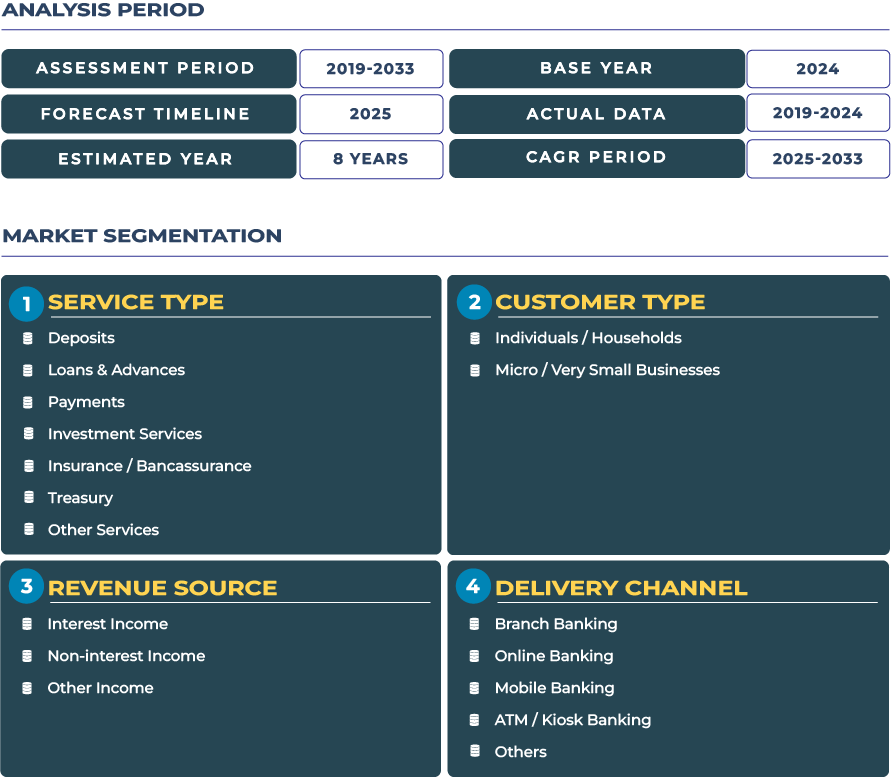Israel Retail Banking Reinvention Through AI-Driven Digital Banking
Israel is rapidly evolving its retail banking sector by anchoring future services in artificial intelligence, personalized algorithms, and digital-first banking models. Buoyed by its robust tech ecosystem and entrepreneurial talent, the country is integrating AI advisory, real-time credit decisions, and seamless digital interfaces into the consumer finance fabric.
Note:* The market size refers to the total revenue generated by banks through interest income, non-interest income, and other ancillary sources.
Market Outlook: Why Israel Retail Banking Market Is Poised for Next-Gen Growth
The Israel retail banking market is estimated to expand from USD 9.7 billion in 2025 to USD 12.4 billion by 2033, reflecting a CAGR of 3.2%. This trajectory reflects the convergence of high digital adoption, regulatory experimentation, and fintech momentum, balanced against geopolitical and regulatory constraints. In a mature market with sophisticated customers, growth will come from richer product layering-embedding AI advisory, alternative credit, and investment modules into banking apps. The surge of fintech and open banking, particularly in tel Aviv, Jerusalem, and Haifa, accelerates this shift. Banks will need to convert consumer touchpoints-payments, P2P transfers, wallet usage-into value relationships via cross-sell and dynamic credit nudges.
Additionally, Israel is experimenting with foundational infrastructure innovations. The Bank of Israel is actively developing the “digital shekel” as a central bank digital currency (CBDC), issuing design drafts and selecting fintech use-case proposals in its “Digital Shekel Challenge.” If adopted, this could reshape payment rails, competition, and retail banking monetization. Coupled with scalable AI capabilities and a thriving fintech startup base, Israel is well-positioned to reimagine retail banking as a tech-native, highly embedded service. The challenge remains to balance innovation speed, resilience, regulatory integrity, and consumer trust in a geopolitically volatile context.
Drivers & Restraints Structuring Israel Retail Banking Path
Deep Tech Ecosystem, Digital Savviness & High Smartphone Penetration as Catalysts
Israel global reputation as a “startup nation” extends naturally to fintech and digital banking innovation. Israel fintech sector is actively embedding AI and open banking solutions into consumer banking-projects like Kipp use AI to assess transaction risk in real time and reduce false declines. The country’s digital‐first talent base and venture capital availability fuel rapid iterations and deployment. Smartphone and broadband penetration are very high, fostering a base of digital-first customers who expect banking services on par with global tech experiences.
Regulatory Friction, Cyber Risk & Geopolitical Pressures as Constraints
However, Israel banking sector must navigate regulatory complexity-data privacy, cybersecurity, licensing, and consumer protection laws impose high compliance overhead. As digital banking operations scale, fraud, identity theft, and system resilience become critical risk vectors. The war with Hamas and regional tensions exacerbate uncertainty: in 2025, the Bank of Israel instructed commercial banks to allocate up to 3 billion shekels for customer relief for those impacted by the conflict. This illustrates how banks must maintain agility and capital buffers in volatile conditions.
Additionally, the retail banking market in Israel is relatively concentrated-major institutions like Bank Leumi, Bank Hapoalim, Mizrahi-Tefahot, and Israel Discount Bank dominate core segments. This concentration limits margin leeway for newcomers and increases the barrier for foreign entrants. Further, while credit underwriting for retail and SME segments is shifting, legacy balance sheets and risk aversion slow full migration to AI-based lending. The digital shekel initiative, while promising, is still under design and subject to public acceptance, which introduces timing uncertainty. (Bank of Israel) These limitations demand disciplined investment strategies and structural flexibility for retail banking players to scale sustainably.
Trends & Opportunities Accelerating Israel Retail Banking Evolution
Trend Focus: Digital Banking Apps, Neo-Banks & AI Advisory Integration
Digital banking in Israel is becoming the default channel. Many banks now offer full-service mobile apps with real-time payments, credit applications, wealth dashboards, loyalty integration, and biometric security. Neobanks and app-only banks (e.g., Pepper) compete on speed, UX, and personalization. AI advisory modules, from predictive spending nudges to smart savings plans, are being integrated to convert routine users into engaged customers. Israeli fintechs are also powering open banking orchestration to allow third-party embedding of nonbank features. This trend transforms user interaction from passive banking toward proactive financial management.
Opportunity Focus: AI-Driven Wealth & Credit Solutions, CBDC-Enabled Innovations
One of the most potent opportunities lies in AI-enhanced wealth management delivered within retail banking platforms. Banks can offer robo-advisory, dynamic portfolio rebalancing, personalized savings goals, and alternative asset access. This helps monetize dormant balances and deepen client stickiness. On the credit front, AI underwriting built on alternative data-transaction patterns, digital behavior, social signals-permits broader inclusion of underserved customers, while managing risk. Embedding micro-credit or instant loans within app journeys boosts conversion and portfolio growth.
Moreover, the digital shekel initiative offers platform-level opportunities: tokenized payments, programmable settlement, loyalty token integration, and micropayments can be layered on a CBDC rail. The Bank of Israel preliminary design document and the Digital Shekel Challenge illustrate that retail banks must be ready to embed CBDC use cases when launched. (Bank of Israel) Early movers who integrate blockchain and programmable-money features into retail banking services can gain structural advantage.
Competitive Landscape: Leading Banks & Strategic Moves in Israel Retail Banking
Israel retail banking is led by institutions such as Bank Leumi, Bank Hapoalim, Mizrahi-Tefahot Bank, Israel Discount Bank, and First International Bank. Bank Leumi has been a driver of digital banking, launching Pepper as a fully mobile app bank and investing in data, personalization, and AI-driven modules. Bank Leumi also reported a 40% jump in profit in 2024, driven by loan growth. Amid public concern over profits during wartime, levers are shifting toward relief measures and consumer support.
Bank Hapoalim supports the bit payments app, which has anchored mobile P2P transfer adoption across Israel. Mizrahi-Tefahot, a leader in mortgage financing, is enhancing its digital mortgage and customer portal capabilities. Strategies across the sector include AI credit scoring pilots, modular open APIs, partnerships with fintechs, investment in cybersecurity infrastructure, and readiness for CBDC integration. The competitive frontier is no longer just scale but technology dexterity, user-centric design, and resilience in uncertain geopolitical climates.







